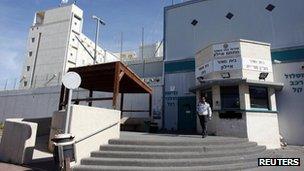Israel confirms it imprisoned man under false name
- Published

Israel has for the first time confirmed it imprisoned an Australian-Israeli man under a false identity for security reasons, and that he died in custody.
The justice ministry did not name the man - previously known as Prisoner X, and recently identified by Australian media as Ben Zygier - but said his family was notified of his detention.
He was held following a court order and his rights were upheld, it added.
The ministry also stated that the man killed himself inside his cell in 2010.
On Wednesday, Australian Foreign Minister Bob Carr ordered a review of how diplomats handled the detention of Mr Zygier, who is believed to have worked for Israel's Mossad intelligence agency.
On Thursday, Mr Carr told a parliamentary committee that Canberra had been informed of Mr Zygier's detention in February 2010.
Australia was told through intelligence channels that he had been detained "in relation to serious offences under Israeli national security legislation".
He "would be treated in accordance with his lawful rights as an Israeli citizen", Australia was told. No request for consular support was received, Mr Carr said.
'Negligence'
Speculation about the existence and identity of Prisoner X has been rife since reports of his death broke in the Israeli media two years ago, despite strict reporting restrictions imposed by the Israeli authorities.
The statement published by the Israeli justice ministry on Wednesday evening gave only a few new details about the case.
"For security reasons, the prisoner was held under a pseudonym, but his family was notified of the arrest immediately," it said.
"The prisoner was held in jail under a warrant issued by a court. The proceedings were overseen by senior officials in the justice ministry and he was duly represented in all the proceedings against him."
The statement added that he "was found dead in his cell two years ago" and that a closed-door inquiry into the death was ordered at the time.
The justice ministry said the investigation concluded six weeks ago that the cause of the prisoner's death was suicide, but that the judge recommended that the state "pursue a negligence investigation".
"National security prevents the release of any other details in this case."
Hanged
The identity of Prisoner X was revealed on Tuesday by the Australian Broadcasting Corporation (ABC), which named him as Ben Zygier.
According to its report, he was an active member of Melbourne's Jewish community before emigrating to Israel in 2000 and serving in the army.
At the time of his death, Mr Zygier was 34 and married to an Israeli woman and had two children.
He is known to have gone by the Hebrew name of Ben Alon in Israel and also carried an Australian passport bearing the name Ben Allen. Fairfax said he had also called himself Benjamin Burrows.
The reason for Mr Zygier's arrest and imprisonment in Israel is not known, but ABC said it understood he had been recruited by Mossad.
Australia's Fairfax Media reported on Wednesday that months before he was arrested in Israel, Mr Zygier was being investigated by the Australian Security Intelligence Organisation (ASIO) on suspicion of fraudulently using his passport for espionage purposes.
Mr Zygier was found hanged in a cell on 15 December 2010, months after he "disappeared", and his body was flown to Melbourne for burial the following week, ABC added.
When the story about Prisoner X first emerged, Israeli media said the unidentified man was being held incommunicado at Ayalon Prison, a maximum security facility in central Israel.
ABC said his cell was fitted with surveillance cameras designed to prevent suicide.
The reason for his detention was not disclosed and his identification was so secret that even his guards did not know who he was, it reported.
An Israeli opposition MP told the BBC he agreed that the government's actions were likely to have been in the interests of national security.
"In general I understand it, but practically I think the government took some steps that may irritate anyone who cares for freedom of expression," Nachman Shai of the Labour party added.